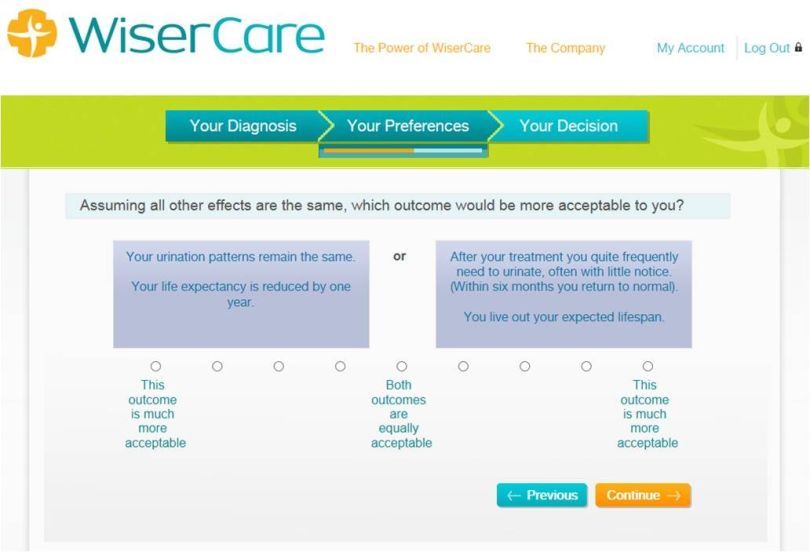[ibimage==30492==Original==https://wisercare.com==self==ibimage_align-left]
In healthcare, “a lot of things get done that we know don’t help people,” said Chris Saigal, co-founder of healthcare decision solution Wisercare.
For example, “we need to delink diagnosing prostate cancer with treating it. Some cancers don’t kill,” said Saigal. Instead of invasive surgery, other treatment options may be just as effective. But too often, when faced with a scary diagnosis, patients choose the most aggressive forms of treatment without much regard to effectiveness.
There is even medical research that shows if a patient is given two equally effective treatment options he or she will choose the more expensive treatment, out of the assumption that the cost is signaling something superior in that treatment.
“Healthcare has lots of possibility for positive change,” said Saigal.
Wisercare believes it can make positive change in healthcare by better informing patients of their treatment options, so that they choose options that provide better results, increase satisfaction and may even reduce costs.
The problem is “health literacy is difficult when you think of the everyman,” said CEO David Cerino.
Medical research is complex and full of jargon that is foreign to patients. For a patient to decide on treatment by sorting through that sort information would be laborious and would require a lot of extra explaining from their physician. So the crux of Wisercare’s solution is asking patients about their priorities in plain everyday English.
Through a conjoint analysis that forces patients to make trade-offs between effects of various treatments, Wisercare’s software creates a report detailing a patient’s treatment preferences, including a number ranking. The report states in simple and plain language, Cerino said: “’Here are your evidence based option and here are your priorities. This allows patients to say, ‘This is who I am.'"
By asking patients trade-off questions, Wisercare's software help patients explain themselves.

“It’s not coming out with one answer, saying, ‘This is what you should do,’” said Cerino. Rather ,it’s creating context for a larger conversation.
If a patient says he is terrified of surgery, Cerino said, then the report and ranking gives the doctor an understanding for what might be the patient’s next best preference.
And if ultimately, surgery is the best option, despite a patient’s reservations, the doctor can now explain surgery with the help of Wisercare’s insight.
In theory, by better matching patients with treatments, Wisercare could increase patient satisfaction and also reduce costs when it pairs patients with treatments preferred and cheaper treatment options.
Also, by increasing understanding and ownership of treatment choice, the Wisercare reports should increased patient engagement, which tends to improve results because patients with more buy-in tend follow post-surgery instructions more closely: “If you have a confident patient, they are going to own their outcome more,” said Cerino.
Healthcare providers are also keen on the idea because less time spent explaining treatments could mean shorter physician visits and better-informed patients will have less ground for medical malpractice suits.
For all those reasons, the industry is taking notice: UCLA Health and Chicago-based Northshore University Medical System have signed on for trial runs.
“Healthcare stakeholders understand there is a lot of inappropriate health spending,” said Cerino. “We are trying to right the system”
As of right now, Wisercare is only being tested within urology, as that is Saigal's specialty. The company has plans to expand the software to orthopedics and women’s health issues after that.
The ability of Wisercare’s software to make sense of medical treatments for the everyday patient is part of a movement towards consumerization of healthcare. For a long time, the complexity of medicine and the rigidity of healthcare regulation has kept patients from owning their healthcare decisions. More and more, technology is helping the industry clear those hurdles. Wisercare is the latest in a coming wave of healthcare innovation.
Wisercare currently has $2 million in seed funding and is closing another seed round in mid-March.



